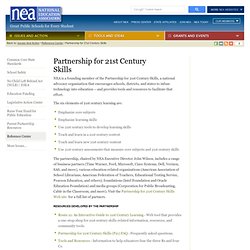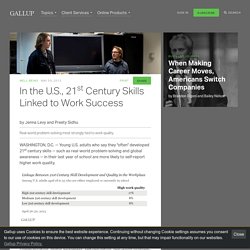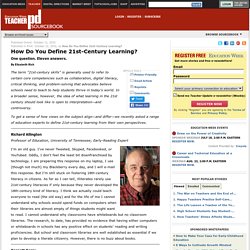

Assessment & Teaching of 21st-Century Skills. Partnership for 21st Century Skills. NEA is a founding member of the Partnership for 21st Century Skills, a national advocacy organization that encourages schools, districts, and states to infuse technology into education -- and provides tools and resources to facilitate that effort.

The six elements of 21st century learning are: Emphasize core subjects Emphasize learning skills Use 21st century tools to develop learning skills Teach and learn in a 21st century context Teach and learn new 21st century content Use 21st century assessments that measure core subjects and 21st century skills Resources Developed by the Partnership Route 21: An Interactive Guide to 21st Century Learning - Web tool that provides a one-stop-shop for 21st century skills-related information, resources, and community tools. Partnership for 21st Century Skills (P21) FAQ - Frequently asked questions. Related Link. In the U.S., 21st Century Skills Linked to Work Success. WASHINGTON, D.C. -- Young U.S. adults who say they "often" developed 21st century skills -- such as real-world problem-solving and global awareness -- in their last year of school are more likely to self-report higher work quality.

Gallup, in collaboration with Microsoft Partners in Learning and the Pearson Foundation, developed a 21st century skills index measuring seven specific areas: collaboration, knowledge construction, skilled communication, global awareness, self-regulation, real-world problem-solving, and technology used in learning. According to the study, 21st century skills prepare and equip youth for the challenges and demands of work in today's knowledge-based, technology-driven, globalized environment.
An in-depth analysis reveals that of these seven areas, real-world problem-solving is most strongly linked to higher self-reported work quality. Although closely related to work success, many young adults report not developing real-world problem-solving skills in school. 8 Tips For 21st Century Skill Building. Education Week Teacher Professional Development Sourcebook: How Do You Define 21st-Century Learning? Published Online: October 11, 2010 Published in Print: October 12, 2010, as How Do You Define 21st-Century Learning?

By Elizabeth Rich The term "21st-century skills" is generally used to refer to certain core competencies such as collaboration, digital literacy, critical thinking, and problem-solving that advocates believe schools need to teach to help students thrive in today's world. In a broader sense, however, the idea of what learning in the 21st century should look like is open to interpretation—and controversy. To get a sense of how views on the subject align—and differ—we recently asked a range of education experts to define 21st-century learning from their own perspectives. Richard AllingtonProfessor of Education, University of Tennessee; Early-Reading Expert I’m an old guy. Barnett BerryFounder and CEO, Center for Teaching Quality Sarah Brown Wessling2010 National Teacher of the Year Twenty-first-century learning embodies an approach to teaching that marries content to skill.
Center for 21st Century Skills — Redesigning education for the 21st Century through the convergence of art, business, creativity, innovation, engineering, and science. The Partnership for 21st Century Skills.